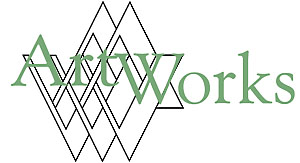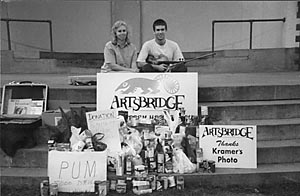
 |
Fall 2002 |
|
Milestones in Morgan WV native wins Tony Award ORBI Arts Network From the director Arts Action! resource kit A steelworker goes to the ball Arts Mongahela workshop Dancing with two left feet Arts conference inspires new ideas Fellowship winner profile
|
Arts conference inspires new ideasBy Lisa Starcher Collins On a Saturday in June, I hurried from Nashville’s airport to the downtown convention center, site of the Americans for the Arts conference. Luggage in tow, I raced into the ballroom 30 minutes late, but still in time: Keynote speaker Kathy Mattea, country music star and native West Virginian, was just being introduced. Thank goodness I made it. The rest of the conference was memorable and useful, but that speech resonated with me throughout. With self-effacing humor, Mattea talked about having been a “gifted,” but bored, student. When her mother took the advice of a guidance counselor and got her involved in music, theater and dance, she discovered her passion. Bored no more, she found the outlets that would lead her to a spectacular career. She lauded the efforts of those in the room — arts administrators like myself — who spend their days (and nights and weekends) looking for ways to bring the best arts to the most people. Mattea also talked about social responsibility, and how the good feelings generated by arts audiences can be used for the public good. When she plans a concert, she talks to the promoter in advance about how she can work with a local charity to do a public service announcement or ask for donations of cans for the local food bank. That got me thinking. We have a free Mayor’s Concert Series in Parkersburg City Park that is generating a great deal of goodwill. Why not use that same principle, and invite concert-goers to benefit a local charity each week?  Dara Krack, guitarist, and her son Jake, fiddler, brought in an estimated $300 for the food bank. We are about halfway through the series now, and so far we have benefited Habitat for Humanity with nails, tape measures and good used tools; the local food bank with nonperishable food items; and the Lions Club’s eyeglass collection campaign. Still to come are collections of pet food for the Humane Society, musical instruments for VH-1’s Save the Music; and postage stamps for ARTSBRIDGE and the Smoot Theater. People seem genuinely glad for an opportunity to give a small donation to a worthwhile cause and to learn more about what local charities are doing. This is a simple way to use that positive energy to do some good, as Mattea suggested. It’s also creating goodwill among the charities, many of which don’t normally work with arts groups. We already have a waiting list of groups wanting to be part of the project next year, and other summer music series around the valley are starting to pick up on the idea. The arts are truly a vehicle for change. An impressive session at the Americans for the Arts conference introduced a new approach to board development of nonprofits. Nonprofits can begin by assessing generational preferences and determining what is needed and best available from each group. For example, the “veteran” generation, born 1922-1943, values dedication, conformity, law and order, respect for authority and duty before pleasure. They tend to be the power brokers, and control a significant portion of the optional spending economy. Conversely, the Generation X-ers (1960 to 1980, and the group into which I fall) have core values of diversity, fun, informality, global thinking and balance. They work to live instead of living to work. They have a casual approach to authority, and expect equal say with those with seniority. Therefore, the two groups approach board leadership and management processes very differently. The session addressed all the age groups, and included ideas for matching age groups with volunteer needs. It was a fascinating discussion, and one that could have continued all day. The ending keynote struck a completely different chord. Jeffrey Taylor, president and CEO of Monster.com, challenged us to think differently about our employees. According to this Harvard Business School graduate and founder of the multi-million-dollar Internet employment search, it is more and more a privilege, not a right, to have employees. How we treat them will impact our field much more than what we pay, since salaries in the not-for-profit world are never going to compete with those in the business of making money. The future? Flexible hours, pleasant work environments, ongoing training opportunities and company morale/camaraderie will build loyalty in an ever-shrinking employment market. In the next five years, Taylor predicts, we will face an employee shortage in this country as more people turn to home-based business and technology-based jobs. He illustrated his message that we need to be continually thinking about new strategies and innovative approaches by asking everyone in the room to take off their right shoe and hold it high in the air. I was hesitant to do so, waiting to see if those around me complied. Apparently I need to develop my risk-taking side! I attended several other informative sessions, but probably derived the most valuable information from informal lunch and roundtable discussions. I also picked up good ideas from an information exchange, where attendees were encouraged to share their print materials. Americans for the Arts offered scholarships for emerging leaders and rural and underserved representatives, and I was most appreciative to receive one. Sometimes there is simply no substitute for getting out of town, taking a fresh look at our programs, comparing them to others and learning from those who face the same daily challenges. I have managed to avoid reinventing the wheel several times by taking tips from colleagues I’ve met at arts conferences, just as I hope to do with the online charity auction. And I have been inspired to spin some new wheels, as we’re doing with the Mayor’s Music Series charities. Americans for the Arts offers annual conferences, as well as subject-based workshops throughout the year, and can be found online at www.artsusa.org. I highly recommend their gatherings as a meeting of minds with experts who are more than willing to share their challenges and successes. Above all, take my advice and GO . . . somewhere else to learn from others. You’ll come home refreshed, renewed and appreciative. Lisa Starcher Collins is president and CEO of ARTSBRIDGE, Inc. in Parkersburg, WV. Contact her by e-mail at [email protected]. |